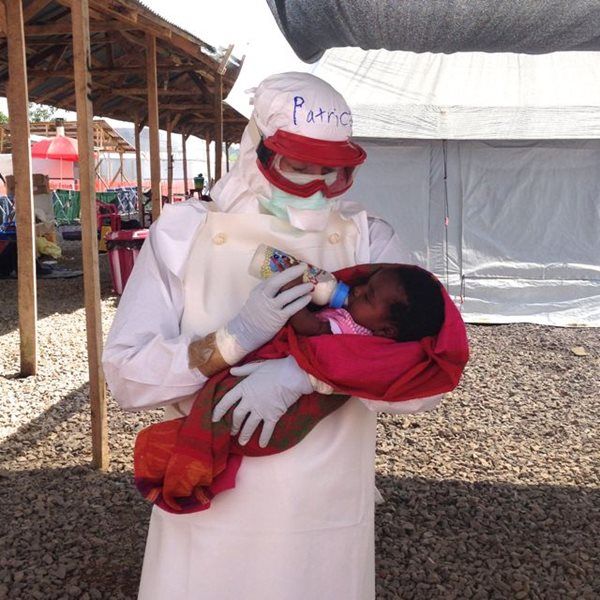A B.C. health care worker who has returned from Sierra Leone is undergoing further tests in an isolation unit at Kelowna General Hospital to rule out the Ebola virus after an initial test came back negative.
Rossland nurse practitioner Patrice Gordon returned to Kelowna Christmas Day after treating Ebola patients at a Red Cross treatment centre in Sierra Leone and was partway into the three-week period of self-monitoring to watch for the emergence of symptoms after potential exposure.
MORE ON PATRICE GORDON’S WORK IN SIERRA LEONE:Rossland nurse headed to epicentre of Ebola outbreak (Trail Daily Times)Chilcotin nurse tackling Ebola (Williams Lake Tribune)Interior Health Facebook page and photos
She began experiencing a low fever and sore throat on Sunday, public health officials say, and drove herself to the Kelowna ER around 6 p.m. Monday to await testing, in accordance with provincial policy for Ebola.
Provincial Health Officer Dr. Bonnie Henry said it’s “very likely” she merely has flu or cold symptoms, not the deadly virus that has killed thousands of people in West Africa.
“The clinical symptoms weren’t consistent with Ebola but we needed to be really sure,” Henry said. “The virus circulating in the blood is often low early on in the illness.”
Test results could come back as early as Wednesday, she said, allowing discharge soon after if Ebola is not detected.
Hospital staff trained on how to deal with Ebola patients ushered her into the hospital through a back door in the back of the ambulance bay, adjacent to the emergency department, where there’s a quarantine room, said Kelowna General Hospital chief of staff Dr. Mike Ertel.
 Gordon is not the only health care worker or traveller who has returned to B.C. from West Africa and under scrutiny for Ebola.
Gordon is not the only health care worker or traveller who has returned to B.C. from West Africa and under scrutiny for Ebola.
PHOTO: Patrice Gordon caring for a one-month-old baby girl who tested positive for Ebola. (redcross.ca)
Seven others are now self-monitoring and not going to work – as the Kelowna patient was up until Sunday – while they wait for the end of the 21-day Ebola incubation period.
Nine previous B.C. individuals have also undergone the three-week wait to ensure no Ebola symptoms appeared.
Only once before has a patient been isolated in a B.C. hospital and tested for Ebola because of the emergency of symptoms that could not immediately be ruled out.
That case was handled in August at Vancouver General Hospital.
No positive Ebola cases have yet been confirmed in B.C.
If one is, the patient will be treated by a specialty team at Surrey Memorial Hospital.
Most health care workers returning to B.C. from serving in West Africa have been in the Lower Mainland, but Henry said there are some in every region of the province.
Gordon issued a statement saying she feels she just has cold symptoms but understands the need to take precautions.
“The biggest concern is that the publicity given to my situation here in B.C. right now might deflect some of the attention from the real issue, which is the plight of the people in Sierra Leone, Guinea and Liberia,” she said.
“I’d like to reassure my family and the public that I have absolute confidence that I am receiving the best of care in a fashion that fully protects the public. I want to encourage everyone to keep the focus where it belongs – back in West Africa.”
Interior Medical Health Officer Dr. Rob Parker called her an “extremely conscientious health care worker” who has had very limited contact with family members since returning from Africa.
One person might be exposed and require follow up if Ebola is confirmed, he said.
Both Parker and Henry said proper procedures were followed at KGH during the transfer Monday afternoon.
They also emphasized that Ebola transmission requires direct contact with blood or bodily fluids and is unlikely to result from someone just walking through an ER.
Kelowna General is one of five B.C. hospitals designated to isolate suspect Ebola patients awaiting testing and treatment within their regions. Other Ebola referral hospitals are Surrey Memorial for the Lower Mainland, Royal Jubilee Hospital for Vancouver Island, University Hospital of Northern B.C. in Prince George for the North, while children would go to B.C. Children’s Hospital.
Even prior to the arrival of any suspect Ebola cases, health officials in B.C. have been grappling with intense anxiety among health care workers and their unions over the procedures to contain the virus.
Although B.C. health officials initially declined to name Gordon or even say where she was from – citing patient confidentiality – the Canadian Red Cross late Tuesday said she has agreed to be identified.
Red Cross officials said Gordon followed protocols for the use of personal protective equipment and she is unaware of any unprotected exposure to Ebola virus.
“During her mission, Ms. Gordon worked at the Red Cross Ebola treatment centre in Kenema where she provided life-saving support and care to those affected by Ebola,” said Red Cross senior manager Stephane Michaud.
“Thanks to the tremendous efforts of aid workers such as Ms. Gordon, the Red Cross has been able to make a real difference in Kenema, where there has been a decline in infections. However, we must remain vigilant as the number of cases across the country remains high.”
– with files from Kathy Michaels, Kelowna Capital News

Nurse practitioner Patrice Gordon (left) learns full garb procedure during Ebola training in Madrid, Spain, prior to going to West Africa to help treat the disease.
